When disaster strikes, most of the population holds onto the hope that the government will step in and restore order swiftly.
We’ve been conditioned, as a society, to believe that there are robust plans in place for any emergency, and that help is just around the corner.
However, the harsh truth is that during a large-scale crisis, the government’s ability to respond effectively diminishes drastically. History has shown us time and again that when the next SHTF event occurs, we are largely on our own.
Self-reliance isn’t just a luxury, it’s a necessity. It was President Reagan who once said that the most terrifying words are ‘I’m from the government and I’m here to help.
The Illusion of Government Preparedness
Government agencies often showcase their preparedness through drills, press conferences, and robust shows of strength.
They attempt to persuade the public that they have contingencies for everything from natural disasters to pandemics. But these assurances create an illusion of readiness that doesn’t hold up under the weight of a real crisis.
Related: 17 Items That Vanished Immediately After the Pandemic
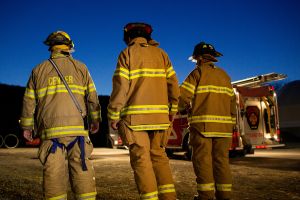 Consider the bureaucratic nature of government operations. Decision-making processes are slow, often bogged down by red tape and a chain of command that hinders swift action.
Consider the bureaucratic nature of government operations. Decision-making processes are slow, often bogged down by red tape and a chain of command that hinders swift action.
During an emergency, time is of the essence. Delays can mean the difference between life and death.
They simply aren’t equipped to handle the widespread chaos that accompanies a national or global catastrophe.
This was especially proven to be the case during several recent disasters, including the widespread fatalities and issues in the aftermath of Hurricane Helene.
Rather than providing the finances and support where it’s needed most, the US Government sends money to other nations while begging its citizens to give to help the people affected. The government is leaving its citizens high and dry.
The Breakdown of Supply Chains
In our globalized world, supply chains are the lifelines that keep societies functioning smoothly. They operate on a just-in-time delivery system, meaning stores stock only what they expect to sell within a short period.
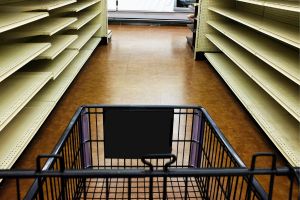
This system is efficient under normal circumstances but incredibly fragile during disruptions.
When a disaster strikes, or a literal strike of workers occurs, panic buying sets in. Grocery store shelves are emptied within hours, and restocking becomes a logistical nightmare.
Roads might be impassable due to debris, flooding, or infrastructural damage. Fuel shortages can halt delivery trucks in their tracks. Ports and airports may be closed or operating at reduced capacity.
The government doesn’t have secret warehouses filled with endless supplies. They rely on the same infrastructure that the private sector uses. If that infrastructure collapses, so does the government’s ability to distribute essential goods.
The fragility of supply chains highlights just how vulnerable most of us are. If roads are blocked, shelves are emptied, and fuel is scarce, how long could you sustain yourself without external help?
That’s the question that led me to explore ways to rely less on these systems altogether. I discovered strategies for becoming more self-sufficient here, and they’ve been a game-changer. If you’re not already thinking about how to survive without supply chains, now’s the time to start.
Law Enforcement: Outnumbered and Outpaced
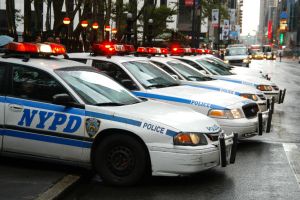 Maintaining law and order is one of the primary responsibilities of the government.
Maintaining law and order is one of the primary responsibilities of the government.
However, during a widespread crisis, law enforcement agencies will quickly become overwhelmed. Police forces are staffed based on normal societal needs, not for extraordinary circumstances involving mass panic or civil unrest.
During disasters, crime rates often spike. Looting, burglaries, and violent crimes become more prevalent as some individuals take advantage of the lack of oversight.
Law enforcement officers may also be dealing with their own personal emergencies, reducing the number of available personnel even further.
Water: The Overlooked Essential
While people often rush to hoard food during emergencies, water is frequently overlooked. Yet, it’s the most critical resource for survival. Municipal water systems are vulnerable to contamination and mechanical failure.
During a crisis, water treatment plants might not function properly due to power outages or staffing shortages.
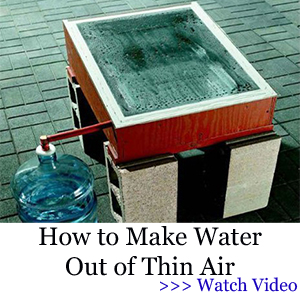 The government may set up distribution points for bottled water.
The government may set up distribution points for bottled water.
But these are often insufficient to meet the needs of the entire population.
Lines can stretch for miles, and supplies can run out before everyone is served.
Without access to clean water, dehydration and waterborne diseases become serious threats.
Medical Infrastructure Under Siege
Our healthcare system operates close to capacity even during normal times. Hospitals have a limited number of beds, medical staff, and supplies. In the event of a large-scale disaster, the influx of patients can overwhelm facilities almost immediately.
During the COVID-19 pandemic, we witnessed how quickly hospitals can reach their breaking point. Now, imagine a scenario with mass casualties, widespread injuries, or a contagious disease with a higher mortality rate.
The government can’t conjure additional doctors, nurses, or medical supplies out of thin air. Field hospitals may be set up, but they often lack the equipment and medications found in traditional hospitals.
Moreover, pharmaceutical supply chains are complex and international. If borders are closed or manufacturing plants are shut down, resupplying essential medications becomes nearly impossible. People with chronic conditions like diabetes or hypertension could find themselves without access to life-sustaining drugs.
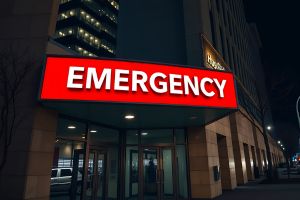 When hospitals are overrun and medications become impossible to source, what will you do? Relying on an already-stressed healthcare system is not an option in a true emergency.
When hospitals are overrun and medications become impossible to source, what will you do? Relying on an already-stressed healthcare system is not an option in a true emergency.
That’s why I took steps to learn how to manage common health issues and emergencies at home.
I learned here how to stockpile antibiotics without a prescription, treat injuries, handle illnesses, and manage chronic conditions when professional help isn’t available. It’s a must-have resource for anyone serious about being prepared.
The Real Threat of Civil Unrest
Social order is a delicate balance that’s easily tipped during times of stress. Fear, uncertainty, and scarcity of resources can lead to heightened tensions among the populace. In extreme cases, this can escalate to riots, violent protests, or clashes between different community groups.
The psychological impact of a disaster shouldn’t be underestimated. When people feel that their survival is at stake, societal norms can quickly erode. The veneer of civilization is thin, and desperation can drive individuals to actions they’d never consider under normal circumstances.
Hurricane Katrina: A Case Study in Systemic Failure
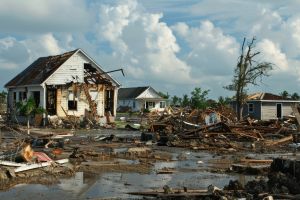 Hurricane Katrina in 2005 was a stark reminder of how quickly societal breakdown can occur and how governmental responses can fall short. Despite warnings about the impending disaster, the evacuation plans were inadequate.
Hurricane Katrina in 2005 was a stark reminder of how quickly societal breakdown can occur and how governmental responses can fall short. Despite warnings about the impending disaster, the evacuation plans were inadequate.
Thousands of residents in New Orleans couldn’t leave due to a lack of resources.
After the hurricane made landfall, the levees failed, and the city was submerged. Emergency services were paralyzed. The Superdome and Convention Center, designated as shelters, became sites of misery and lawlessness.
Related: 14 Things to Stockpile for the Next Hurricane
Basic necessities such as food, water, and medical care were scarce. It took days for substantial federal assistance to arrive, and even then, the efforts were criticized for being disorganized and insufficient.
Looting became rampant, not just for supplies but also for opportunistic theft. The police forces were overwhelmed; some officers abandoned their posts, while others were accused of participating in criminal activities themselves. The breakdown of law and order was palpable.
Katrina exposed the flaws in disaster preparedness and response at all government levels. It showed that in the face of overwhelming disaster, governmental systems could fail catastrophically, leaving citizens to fend for themselves.
The Imperative of Self-Reliance
 The lessons from past disasters underscore a critical point: we cannot depend on the government for our survival during a crisis, or at any point for that matter.
The lessons from past disasters underscore a critical point: we cannot depend on the government for our survival during a crisis, or at any point for that matter.
Self-reliance isn’t always about mistrusting the government; it’s about understanding the practical limitations that any large institution faces during emergencies.
Being self-reliant means taking proactive steps to prepare for potential crises. It’s about having the necessary supplies and skills to survive independently for an extended period.
This preparation isn’t a sign of paranoia; it’s a responsible approach to safeguarding yourself and your loved ones.
The Psychological Aspect
Preparing physically is only part of the equation. Mental and emotional preparedness are just as crucial. Disasters can be traumatic, and maintaining a clear head is essential for making sound decisions.
- Stay Calm: Practice stress-reduction techniques like deep breathing.
- Be Adaptable: Rigid plans can fail. Be ready to adjust your strategies as situations evolve.
- Maintain Morale: Keeping spirits up in your household can improve everyone’s ability to cope with the crisis.
The government’s inability to handle large-scale crises isn’t necessarily due to incompetence but rather the inherent limitations of managing emergencies that affect millions simultaneously. Recognizing this limitation empowers you to take control of your own safety and well-being.
In a world where supply chains can collapse overnight, waiting for help that might not arrive in time is a gamble you can’t afford to take. By knowing how to create your own systems for water, energy, and food storage, you reduce your vulnerability to the inevitable chaos that accompanies major disasters.
That’s why I started learning how to build systems that don’t rely on the grid—everything from emergency heating and lighting to food and water supplies. This guide is a blueprint for off-grid living, offering dozens of survival projects that anyone can build. It’s one of the best investments I’ve made in my preparedness journey.”
Remember, preparedness isn’t about fear; it’s about foresight. It’s a practical approach to ensuring that when the next SHTF event occurs—and it’s a matter of when, not if—you won’t be left helpless. Your proactive measures today are the best insurance for your survival tomorrow.
You may also like:
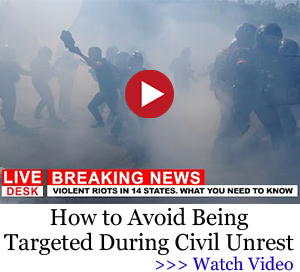 10 Probable Events That Will Follow an EMP
10 Probable Events That Will Follow an EMP
Veggies You Only Plant Once and Harvest Forever
Why You Should Put a Silver Coin in Water

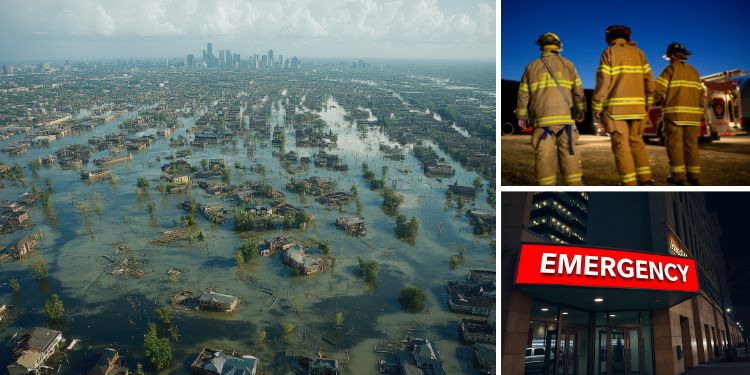






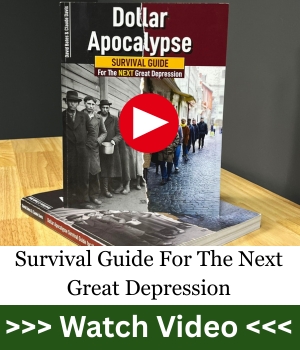





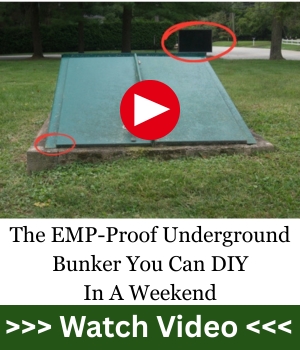






The Citizens are paying into a dishonest Government system. Even though the Tax is collected, most of it is laundered away to Politicians pet projects. The Citizens must begin to understand that, “You will own nothing and be happy!” Is another way of saying that “Slaves don’t own Property.”
Good afternoon. Your post resembles like-minded as/like Brad over at FSS. I listen to him daily and at times twice when he transmit/broadcasts an important issue. Being vigilant and non-complacent is the order of the day.
Protocol is already in place! It’s implemented cookie cutter style. Common sense is not part of the equation. Quarantine is used to control and move populations to “safe “locations. Leave with the clothes on your back. Anyone found in the quarantined area after time constraint is assumed to be the enemy. You are on your own. Choose the consequences you’re willing to accept. Hard pill to swallow! FEMA assumes control of all assets police, ems, fire…ect.
Good afternoon. Your post resembles like-minded as/like Brad over at FSS. I listen to him daily and at times twice when he transmit/broadcasts an important issue. Being vigilant and non-complacent is the order of the day.
Living in a city like New Orleans which 80% is below sea level and surrounded by river’s , iakes , swamps,you should at least have a life jacket near by…my research says that 50% that drown in Katrina aftermath were the elderly. Demacrate governor………
Maintaining law and order is one of the primary responsibilities of the government.
We have TOO MANY laws and far too much order for any semblance of freedom.
Jefferson said we should toss it all out and start over every 19 years laws AND government workers.
And stick to the premise that individual freedom is paramount.
Without personal freedom you have NOTHING.
When a government rounds up it’s people, expect a despotic tyranny to manifest.
Those with guns (aka cops in particular) will force you to obey at gun point. Hence the reason governments do not want the people well armed.
Heck cops already burst in with real assault weapons pointing at people.
The actual job of the cops is to protect us FROM governments, not be their henchmen.
Job of law enforcement was set on the shoulders of the local elected Sheriff (only and personally – no deputies) and the civilian Militia (aka Posse).
If we need a police force then we have too many of the wrong laws.
Police are not now your allies or friend.
They will be far worse in a SHTF scenario. Anything in uniform will be your enemy.
They can be worse than most criminals.
Expect them to do a lot of ‘confiscations’.
Do what they did in the old west which was – shoot thieves, robbers, muggers, and the like.
Better to die on one’s feet than serve on their KNEES.
If you don’t have any law’s…..you don’t have a country.
Just wait until the orange idiot is in office. It will be 100 times worse.
The troll speaketh
They have heavy duty meds for your insane level of TDS.
Well …Trump was in office….and it was a whole lot better than the last four lawless years…now on the verge of WW-3 and total government corruption. The Democrats true colors on full public display. Hopefully never to rise again…..Democrate open borders….what part of that was good ? Democrate controlled media ….not letting other opinions be heard ? Whats good about that….Much work to be done…..all within the law…a breath of fresh air….God’s Speed . P.S. i don’t think martial law was declared during Katrina ….not sure…i could be wrong.
Very good reading. I am taking precautions and have preparing a year ago. I need a few more things and I am 70 years old. I take it seriously 😒. May God help me in a critical situation. I got my gun too!